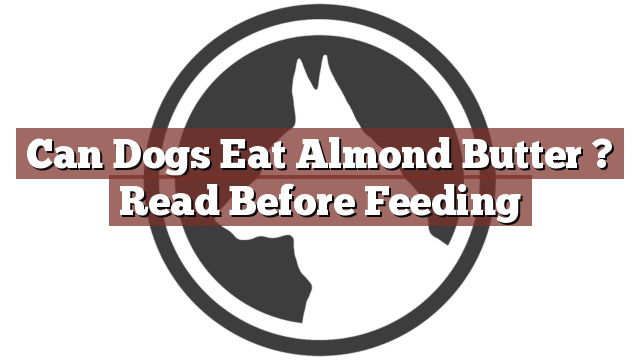Understanding Your Dog’s Dietary Needs
As responsible pet owners, it is crucial to understand our dog’s dietary needs to ensure their overall health and well-being. While it can be tempting to share our favorite foods with our furry friends, it is essential to know what is safe and beneficial for them. Dogs have different nutritional requirements than humans, and certain human foods can be harmful to them. Therefore, it is essential to consult with a veterinarian before introducing any new food into your dog’s diet.
Can Dogs Eat Almond Butter? Read Before Feeding
Can dogs eat almond butter? This is a common question among dog owners who might be considering adding almond butter as an occasional treat or a way to administer medication. The answer is yes, but with caution. Almond butter is generally safe for dogs to consume in moderation. However, it is vital to be aware of a few considerations before feeding it to your furry friend.
Almond butter is high in healthy fats, protein, and vitamin E, which can have some health benefits for dogs. It can be a tasty and nutritious treat, especially for those canines who love the nutty flavor. However, it is crucial to choose almond butter that is unsalted and free from artificial sweeteners like xylitol, as these can be toxic to dogs. Additionally, some dogs might have allergies or sensitivities to nuts, so it is essential to observe your dog’s reactions after feeding them almond butter for the first time.
Pros and Cons of Feeding Almond Butter to Dogs
Feeding almond butter to your dog has its pros and cons, and it is important to weigh them before incorporating it into their diet. On the positive side, almond butter can be a good source of healthy fats, which are essential for a dog’s skin, coat, and overall immune system. It also provides protein, which is crucial for muscle development and repair. Furthermore, almond butter contains vitamin E, an antioxidant that helps protect cells from damage.
However, it is important to note that almond butter is high in calories and fat. While this can be beneficial for dogs who need to gain weight or have a high energy requirement, it can be problematic for those who are overweight or prone to pancreatitis. Therefore, it is crucial to feed almond butter in moderation and consider your dog’s specific dietary needs and health condition.
Conclusion: Considerations and Final Thoughts
Can dogs eat almond butter? The answer is yes, as long as it is given in moderation and with careful consideration of your dog’s health. It is essential to choose unsalted almond butter without any artificial sweeteners. Additionally, it is crucial to monitor your dog for any signs of allergies or digestive issues after feeding them almond butter for the first time.
Remember that every dog is different, and what works for one might not work for another. Consulting with your veterinarian before introducing new foods into your dog’s diet is always recommended. By understanding your dog’s dietary needs and making informed choices, you can ensure that your furry friend stays healthy, happy, and satisfied.
Thank you for taking the time to read through our exploration of [page_title]. As every dog lover knows, our furry friends have unique dietary needs and responses, often varying from one canine to another. This is why it's paramount to approach any changes in their diet with caution and knowledge.
Before introducing any new treats or making alterations to your dog's diet based on our insights, it's crucial to consult with a veterinarian about [page_title]. Their expertise ensures that the choices you make are well-suited to your particular pet's health and well-being.
Even seemingly harmless foods can sometimes lead to allergic reactions or digestive issues, which is why monitoring your dog after introducing any new food item is essential.
The content provided here on [page_title] is crafted with care, thorough research, and a genuine love for dogs. Nevertheless, it serves as a general guideline and should not be considered a substitute for professional veterinary advice.
Always prioritize the expert insights of your veterinarian, and remember that the health and happiness of your furry companion come first.
May your journey with your pet continue to be filled with joy, love, and safe culinary adventures. Happy reading, and even happier snacking for your canine friend!

